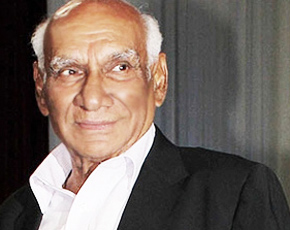
Long before he became the Baadshah of Romance, Yash Chopra was the change that ushered in a new phase of Hindi cinema. For a man known for his cinematic romance, Chopra’s first few films were far removed than the genre he’d be best associated with. His debut Dhool Ka Phool (1959) had romance as the stepping-stone but dealt with the trials of a single woman who abandons her child born out of wedlock. His next Dharmputra (1961) revisited post-partition communal disharmony and the result troubled Chopra so much that he swore off that theme. With Waqt (1965) Chopra had finally arrived and in great style too. The tale of three brothers separated at birth and reunited after living through a gamut of emotions, Waqt had great songs (Aye Meri Zoharajabeen, Aage Bhi Jaane Na Tu), great one-liners (‘Yeh chaaku hai, lag jaye toh khoon nikal aata hai’ or ‘Jinke khud ke ghar sheeshe ke ho voh dusron ke ghar pe patthar nahin pehenka karte’), and a suave villain like Chinoy Seth and it ended up presenting Hindi cinema with a perfect template of action, drama, romance and great tunes that still get the job done.
One of the things that made Yash Chopra stand apart from others was that he never allowed the rules to dictate him. Right from his first film till the very end of his 53-year long career, he was very well aware of the rules that governed Hindi cinema and chose to break them without making a fuss. This was a quality that he picked up from his elder brother. Assisting his brother B. R.Chopra on films like Naya Daur (1957), Yash Chopra understood the value of believing in what one was doing and this is the one thread that runs through his body of work. He is also the one who might be responsible for sowing the seeds of the Angry Young Man with his film Aadmi Aur Insaan (1969) where his anti-hero (Feroz Khan) wasn’t apologetic for being rich and bending the rules to suit his needs and ends up walking away with the glory over the upright hero (Dharmendra). He might have shook things a little with Waqt or Aadmi Aur Insaan but the film where Chopra truly rocked the foundations of popular Hindi cinema was Daag (1971). The debut of YashRaj Films, Daag, was a box-office success in spite of suggesting bigamy as the solution for a love triangle. If Chopra tried attempting to alter the morality of Hindi cinema’s hero with Daag, he managed to completely transform it with Deewar (1975). One might credit Salim-Javed with the creation of the Angry Young Man and Amitabh Bachchan for embodying it but it was Chopra with films like Deewar, Trishul (1978) and Kaala Pathar (1979) who truly immortalized it. Even in Kabhie-Kabhie (1976), where romance was in the forefront, Chopra gave us a variation of the Angry Young Man.
It’s strange that the two films that created Chopra’s King of Romance persona were his biggest box-office failures. Would things be different if Silsila (1981) hadn’t traded a better part of its fictional account for the alleged reality of Amitabh Bachchan-Jaya Bahaduri-Rekha? The film that truly gave us the cornerstones of a Yash Chopra romance, Silsila was to originally feature Smita Patil, Padmini Kohlapure or Parveen Babi. Similarly

Lamhe’s (1991) Mills & Boon like treatment of the May-October romance just didn’t hit the mark but both these films continue to enjoy a cult status. There is an entire generation that simply refuses to look beyond women in white chiffon sarees in the Swiss Alps or the cobbled streets of Zurich or the spa town of Baden-Baden Germany when they think of Yash Chopra. So much so that even Shah Rukh Khan convinced the late director to shoot a song in Europe for Jab Tak Hai Jaan (2012), Yash Chopra’s fourth film with him, for how could a Yash Chorpa film not feature Europe. In his death Hindi cinema has lost one of its biggest ambassadors and looking back, it’s clear that life wasn’t supposed to have just one Yash Chopra for that wouldn’t be enough for the dreams that a billion people saw.
[polldaddy poll=6630718]

The views expressed by this blogger and in the following reader comments do not necessarily reflect the views and policies of the Dawn Media Group.










































